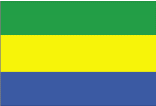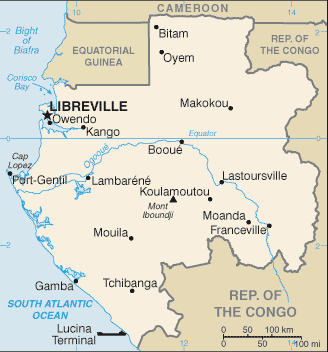|
Gabon
|

|
Capital: Libreville
Population: 2,172,579
Brief History of Gabon:
The original human settlers in Gabon were pygmies. In the 13th century the Bantu tribes entered the area, largely to escape from enemies or to find new land. The first Europeans to visit the land were the Portuguese in the 15th Century. They gave the name gabao, or coat, to the land because they thought the shape of the Komo River looked like a coat.
Soon the French, the Dutch, and the English arrived in Gabon. The area became a major center for the slave trade.
In 1885 France occupied Gabon and made it part of French Equatorial Africa in 1910. Gabon would be part of this group until 1960 when it gained its independence. Since that time Gabon has had two long serving president dictators. The first was Leon M'ba and the second was El Hadj Omar Bongo Ondimba.
The Geography of Gabon
Total Size: 267,667 square km
Size Comparison: slightly smaller than Colorado
Geographical Coordinates: 1 00 S, 11 45 E
World Region or Continent: Africa
General Terrain: narrow coastal plain; hilly interior; savanna in east and south
Geographical Low Point: Atlantic Ocean 0 m
Geographical High Point: Mont Iboundji 1,575 m
Climate: tropical; always hot, humid
Major cities: LIBREVILLE (capital) 619,000 (2009), Port-Gentil
The People of Gabon
Type of Government: republic; multiparty presidential regime
Languages Spoken: French (official), Fang, Myene, Nzebi, Bapounou/Eschira, Bandjabi
Independence: 17 August 1960 (from France)
National Holiday: Founding of the Gabonese Democratic Party (PDG), 12 March (1968)
Nationality: Gabonese (singular and plural)
Religions: Christian 55%-75%, animist, Muslim less than 1%
National Symbol: black panther
National Anthem or Song: La Concorde (The Concorde)
Economy of Gabon
Major Industries: petroleum extraction and refining; manganese, gold; chemicals, ship repair, food and beverages, textiles, lumbering and plywood, cement
Agricultural Products: cocoa, coffee, sugar, palm oil, rubber; cattle; okoume (a tropical softwood); fish
Natural Resources: petroleum, natural gas, diamond, niobium, manganese, uranium, gold, timber, iron ore, hydropower
Major Exports: crude oil 77%, timber, manganese, uranium (2001)
Major Imports: machinery and equipment, foodstuffs, chemicals, construction materials
Currency: Communaute Financiere Africaine franc (XAF); note - responsible authority is the Bank of the Central
National GDP: $24,770,000,000
** Source for population (2012 est.) and GDP (2011 est.) is CIA World Factbook.
Back to Geography Home Page
